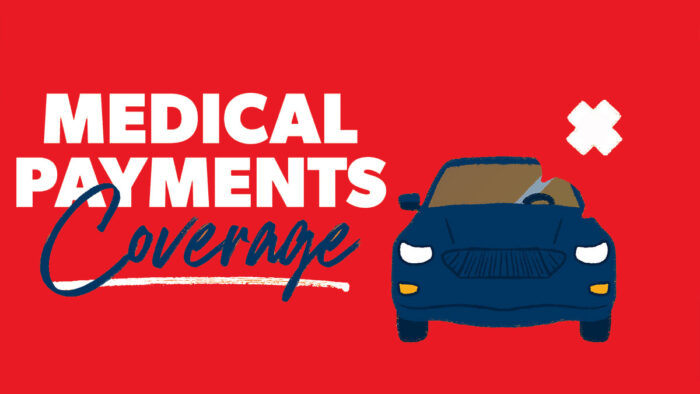Medical payments coverage, also known as MedPay, is a type of coverage that helps to cover medical expenses and funeral costs in an accident, regardless of who was at fault. MedPay helps pay for medical bills in a situation where one of your family members is hit by a vehicle while they’re walking, riding a bike, or traveling in another vehicle different from yours.

You can refer to your medical payments coverage if you’re hit by a car while walking across the street or have any other related issue.
Although it is optional coverage in most states, it does not dispute the fact that it offers a load of advantages that individuals can benefit from. So, policyholders can include it as an add-on policy to unlock the benefits it has to offer.
What MedPay Covers
Medical payment coverage can cover the following:
- Health insurance and deductible.
- Treatment of injuries includes medical, dental, surgical, chiropractic, and other related care.
- Ambulance fees and emergency room services.
- Funeral costs.
- X-rays, prostheses, and nursing.
Most often than not, medical coverage payments can also extend their coverage to non-relatives who were passengers in your vehicle when the accident occurred.
What MedPay Doesn’t Cover
Just like every other insurance policy, medical payment coverage also has its limitations. There are extents to which this policy can provide coverage. MedPay does not cover
- Costs that go beyond your policy’s limit.
- Childcare expenses if you’re limited by accident injuries and during your recovery state.
- Wage reimbursement if you’re unable to perform work activities due to injuries.
- MedPay will not cover treatment for injuries or other health problems that are not related to a car accident.
Additionally, it does not cover the medical costs for injuries inflicted on other drivers on lives in an accident.
Who Needs Medical Payments Coverage?
The answer to this question depends on the individual needs and requirements of the states you reside in. While medical payment coverage is optional for most drivers, it is required for those who reside in Maine and Pennsylvania.
However, individuals whose state does not mandate having this coverage can decide to purchase MedPay coverage as an add-on policy.
In New Hampshire, MedPay is not required, but those who choose to buy car insurance must include MedPay in their insurance policy. Also, if you have personal injury protection, you don’t necessarily have to purchase MedPay.
What You Should Consider Before Adding MedPay to Your Policy
The paramount thing to consider when deciding whether or not you need this coverage is to understand the fact that medical payment coverage and health insurance can work hand in hand, and at the same time, they have their own distinct type of coverage.
MedPay is capable of covering part of your health insurance deductible or copays, while health insurance can cover certain expenses once your MedPay has reached its limit.
You should consider getting MedPay if you drive passengers regularly and seek protection in case of injuries or other health problems.
Assess and review your needs properly before you obtain MedPay for your policy. Consider if your health insurance has high deductibles and if you’re capable of paying for medical expenses out of pocket if you’re involved in a car accident. This would help you determine if MedPay can be beneficial to you and your relatives.
Where Can I Buy MedPay?
Owing to the fact that medical payment coverage is available in most states, you can easily obtain one from your insurance company or agent. Outlined below are the states that require MedPay:
- Arkanas
- Delaware
- Maryland
- New Hampshire
- Oregon
- South Dakota
- Texas
- Virginia
- Washington
- Wisconsin
If you reside in any of these states, you can get MedPay from a variety of insurance companies. Although there are other states that do not require this coverage, we think purchasing one can be of huge advantage to you and members of your family.
FAQs
Do I need MedPay if I have health insurance?
Having health insurance combined with medical payment coverage offers several benefits beyond what you can think of. If you have high deductibles or copays under your health insurance, your medical payment coverage could be able to cover some medical costs, ultimately helping to reduce financial stress and burden.
Also, MedPay offers protection to everyone in your vehicle should an accident occur. Therefore, having MedPay and health insurance is not totally a bad idea; you should consider getting both.
How much medical payment coverage should I have?
The extent of medical payment coverage typically depends on your needs; you can weigh your specific needs and determine how much coverage you want. You can find affordable car insurance that includes medical payment coverage due to the fact that it is low-cost coverage.
You can also consult a certified insurance agent, who can offer advice on how to determine the proper amount of medical payment coverage that encompasses your needs.
What’s the difference between medical payments coverage and liability car insurance?
Both medical payment coverage and liability car insurance offer coverage for a wide range of risks and problems. While MedPay covers the cost associated with you and your passenger’s medical treatment and other expenses, liability car insurance basically covers property damage and bodily injuries you cause to others in an accident.
The difference between the two is that MedPay provides protection up to your policy limit, regardless of who is at fault for the accident, while liability insurance is used to pay for the medical expenses of the other driver or affected party if you cause an accident.
It is also important to point out that medical payments do not cover proper damage or legal costs.



